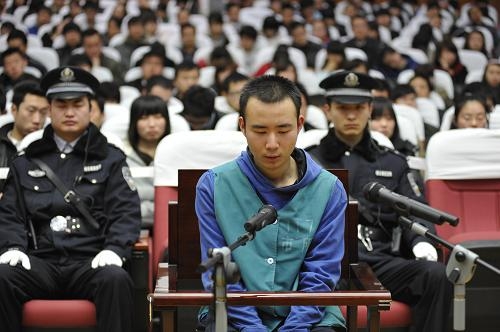


The "Passion" of Yao Jiaxin
By Qi Yue (启越), an EO columnist
Nation, page 16
Issue 512, March 28, 2011
Original: [Chinese]
College Student Yao Jiaxin stabbed a woman six times after running her over with his car. But according to his lawyer, Yao is a model student with a spotless record who simply committed a "crime of passion."
As anyone who is remotely acquainted with the law knows, a "crime of passion" proceeds from an emotion or impulse, usually provoked by something the victim did. The only thing the 26-year-old mother Yao stabbed to death did was to look at his license plate.
If this is a crime of passion, then the lesson to be learned is don't look at the license plate if you've been hit by a car because the driver will get out of the car and kill you.
It is possible that Yao has had a strict, psychologically damaging upbringing by a tiger mother (or father). Many Chinese children have. Most do not become killers.
Yao is not the first to commit this type of crime. In Chengdu in 2006, a boy was repeatedly run over by a Mercedes until he died. In Jiangsu in September 2010, after hitting and injuring a child on the road, a BMW driver purposely crushed the child to death with his car.
The thinking behind these crimes is simple. In Beijing, the maximum amount of compensation that should be paid to the family of a victim of vehicular manslaughter is about 400,000 yuan. But if the victim is injured and sues in court, compensation can easily top 1 million yuan.
It's not a crime of passion, it's a game of numbers.
 Baidu Kowtows Only to "The Strong"
Baidu Kowtows Only to "The Strong"
By Kong Ergou (孔二狗), a popular online author who rose to prominence after publishing a series of novels called The Old Days in the Northeast: A Twenty-year Chronicle of the Mafia (东北往事:黑道风云二十年) on Tianya.cn.
Economic Observer Online
March 31, 2011
Original: [Chinese]
Baidu issued a "Letter of Apology" after popular author Han Han publically criticized the company for its stance on copyright infringement.
According to the letter, Baidu will remove all content that violates existing copyrights at the urging of "important persons."
Needless to say, the works of writers protected by large publishers will be removed. But what about the works of lesser-known authors, authors who have less leverage, who cannot force Baidu to remove their content?
Baidu also apologizes for "hurting the feelings" of writers. But what about their interests?
Baidu has no respect for literary copyright. They are happy to infringe upon authors' rights until they are challenged by a formidable opponent. Even then, they concede only to famous authors. The rights of lesser-known authors and aspiring writers continue to be neglected.

